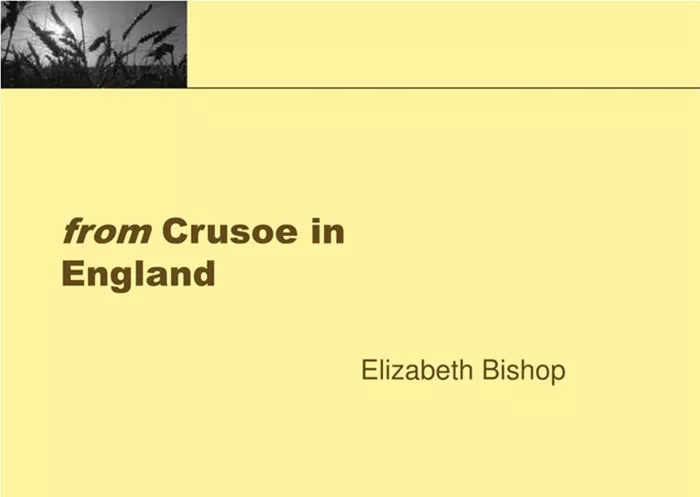Welcome to Poem of the Day – Crusoe in England by Elizabeth Bishop
Elizabeth Bishop, known for her keen observational skills and delicate emotional insight, presents in her poem Crusoe in England a reflection on isolation, identity, and the passage of time. This poem takes inspiration from the famous character Robinson Crusoe, created by Daniel Defoe, but Bishop presents him in a context far removed from the adventure-filled, survival-driven narrative of the novel.
Crusoe in England Explanation
Overview of Crusoe in England
In Crusoe in England, Bishop imagines the life of Robinson Crusoe after his return to England, long after his years of living alone on a desert island. The poem delves into Crusoe’s inner conflict and emotional state, as he navigates a world that is no longer familiar to him. Now back in the comforts of civilization, he is burdened by a deep sense of alienation. The poem questions the nature of belonging, the effects of solitude, and the ultimate price of survival.
Themes in the Poem
Isolation and Loneliness: The most significant theme in Crusoe in England is isolation. Crusoe, though physically surrounded by people and civilization in England, finds himself emotionally isolated. He feels disconnected from those around him, haunted by memories of his years of solitude on the island. Even though his survival story is one of overcoming extreme loneliness, it is clear that this prolonged isolation has left deep emotional scars.
Identity and Transformation: Bishop explores how living in isolation has transformed Crusoe’s sense of self. The physical isolation from society mirrors a psychological transformation. Crusoe’s identity has been so shaped by his solitary existence that he no longer knows how to engage with others. His time on the island has turned him inward, and the person who returns to England is not the same person who left.
Time and Memory: The passage of time is another central theme. The poem reflects on the way time passes, but how it can never truly heal the deep wounds caused by solitude. Crusoe’s memories of his years on the island remain vivid and painful, reminding him that the past can never be fully escaped. Bishop uses Crusoe’s reflection on time to examine the inescapable nature of his experiences, which continue to shape his life even in the supposed safety of England.
The Struggle Between Civilization and Wilderness: Bishop also contrasts the civilized world of England with the wilderness of the island. Crusoe, having survived and thrived in an environment that stripped him of all comforts and security, now finds the rules and structures of society stifling. His attempt to re-enter society reveals the tension between the comforts of civilization and the wild freedom he once experienced.
Key Imagery in the Poem
Bishop uses rich imagery to depict Crusoe’s psychological landscape. Her descriptions of England are often cold and unwelcoming, highlighting the contrast with the warmth and simplicity of the island. Through this imagery, she illustrates the inner conflict Crusoe faces—he is unable to reconcile the two vastly different worlds he has inhabited.
One key image in the poem is the presence of the “footprints” Crusoe sees, which are remnants of his past life on the island. This image serves as a metaphor for the lasting impact of isolation and survival. Even in England, where he is meant to be free from his past, the marks of his solitude remain.
The Poem’s Tone
The tone of the poem is reflective and melancholy. Bishop doesn’t simply focus on the literal events of Crusoe’s life; she explores his inner world. There’s an overwhelming sense of sadness as Crusoe tries, but fails, to reintegrate into a world that no longer makes sense to him. The loneliness that once drove him to fight for survival is now a burden, and the emotional distance he feels from others is palpable.
Conclusion
Crusoe in England by Elizabeth Bishop is a powerful meditation on the effects of isolation, identity, and the passage of time. The poem provides a unique perspective on the famous literary character of Robinson Crusoe, not as a man struggling for survival but as one who struggles to make sense of a life he can never fully return to. Through vivid imagery and a reflective tone, Bishop explores deep emotional truths that resonate far beyond the individual experience of Crusoe, touching on universal themes of memory, transformation, and the complexities of belonging. In this way, Bishop invites the reader to reflect on their own experiences of isolation and reintegration, making the poem a profound and poignant exploration of the human condition.

